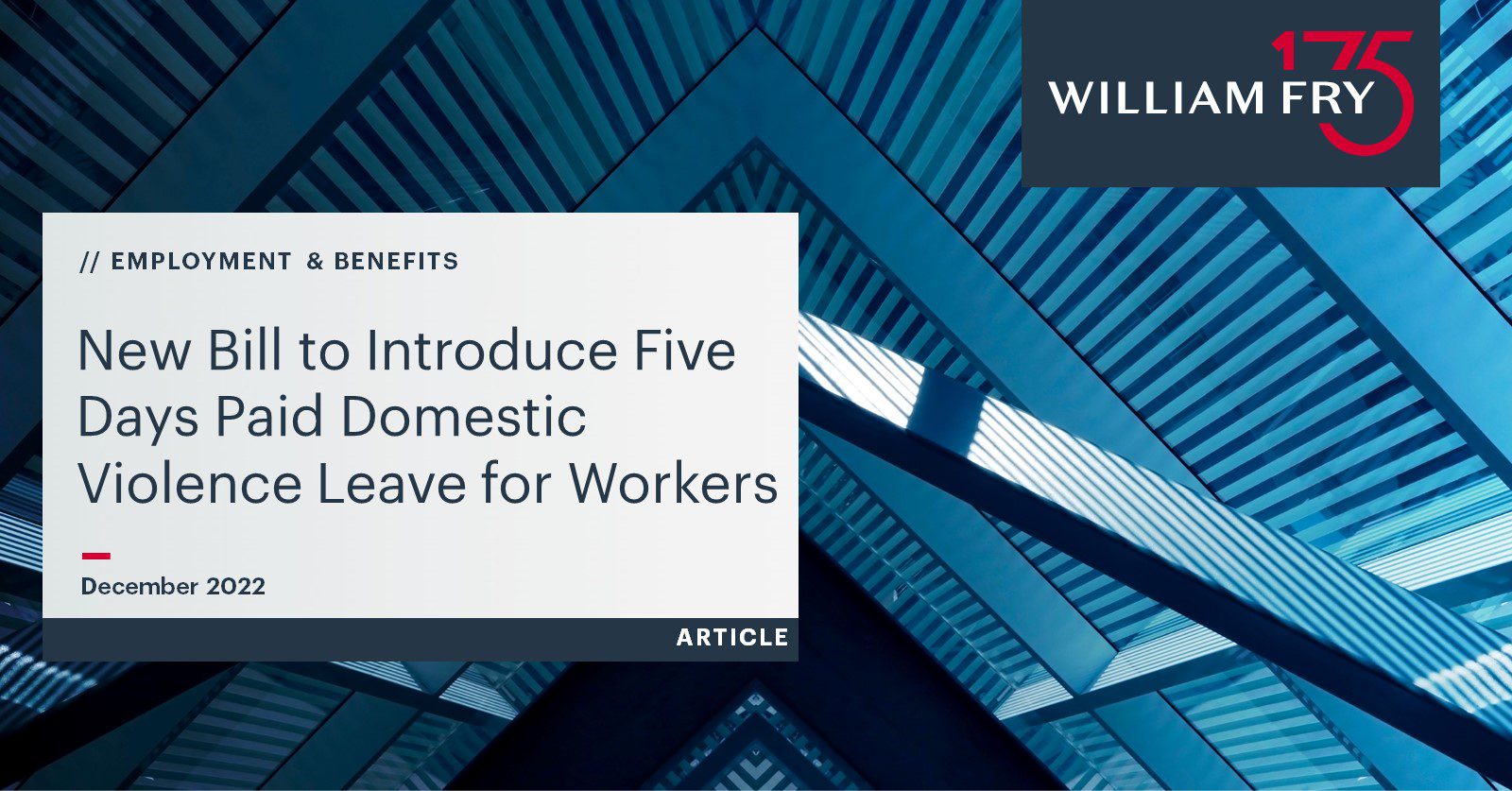Womens Aid say that calls to their Freephone Helpline are expected to rise by 17% after the Christmas period. In the article, we review legislative developments in this area.
The Department of Children, Equality, Disability, Integration and Youth has recently been examining paid domestic violence leave internationally and has engaged in a lengthy consultation process to identify a suitable model for rollout in Ireland.
The Government has now approved the publication of the Work Life Balance and Miscellaneous Provisions Bill 2022 (Bill), which will introduce five days of paid leave for those suffering from, or at risk of, domestic violence.
Once enacted, this legislation will support workers to remain employed and maintain financial independence, allowing them space to seek the necessary support. Some private and State-backed organisations have chosen to introduce this leave already. However, this is the first statutory employment benefit when it comes to domestic violence, and its introduction will significantly impact employees suffering from, or at risk of, domestic violence.
Who can avail of the leave?
Any employee who has entered into, or works under, a contract of employment can avail of the leave. This includes part-time employees and fixed-term employees. The Bill provides that employees are entitled to paid domestic violence leave from their employer where the employee or a “relevant person” has experienced in the past, or is currently experiencing, domestic violence.
What does “relevant person” mean?
A relevant person is defined in the Bill as:
- the spouse or civil partner of the employee;
- the cohabitant of the employee;
- a person with whom the employee is in an intimate relationship;
- a child of the employee who has not attained full age; or
- a person who, in relation to the employee, is a dependent person.
How does the Bill define domestic violence?
Domestic violence is defined as violence or the threat of violence, including sexual violence and acts of coercive control that has been committed (now or in the past) against an employee or a “relevant person” by any of the following:
- the spouse or civil partner of the employee or relevant person;
- the cohabitant of the employee or relevant person;
- someone who is, or was, in an intimate relationship with the employee or relevant person; or
- a child of the employee or relevant person who is of full age and is not, in relation to the employee or relevant person, a dependent.
What is the purpose of the leave?
The purpose of domestic violence leave is to enable victims of domestic violence to seek medical help, obtain counselling, relocate, seek advice or assistance, or obtain a safety order from the courts. As the leave also extends to relevant persons, employees may avail of the leave to assist the relevant person in any of these ways.
How many days leave are employees entitled to under the Bill?
Employees will be entitled to five days paid domestic violence leave in any period of 12 consecutive months. The Work Life Balance and Miscellaneous Provisions Bill 2022 Report recommended that this leave be increased to ten days. Ultimately, this was not passed. However, during a recent Dáil Éireann debate, there was a discussion that the number of days paid leave may be reviewed after two years.
What will the prescribed rate of pay be for employees availing of the leave?
The Bill provides that the Minister for Children, Equality, Disability, Integration and Youth may make regulations to prescribe the daily rate of domestic violence leave pay, which may be capped at a maximum daily amount.
Is there a service requirement for employees wishing to avail of the leave?
As the Bill is currently drafted, there is no minimum service requirement for employees to avail of this leave.
Will employees be required to show proof of domestic violence?
No, employees will not be required to produce proof of domestic violence to avail of the leave. Before the Government approved the publication of the Bill, the introduction of paid domestic violence leave was the subject of various submissions and comments, with some suggesting that employers should be legally allowed to require proof of domestic violence from employees wishing to take the leave. Ultimately, it was decided that requiring employees to produce proof of domestic violence would be impractical, particularly with proof of coercive control, which would be very difficult for an employee to prove.
What’s next?
The long-awaited Bill has passed pre-legislative scrutiny. It has been revised more than once, following stakeholders’ and the Government’s input. The most recent version of the Bill was published on 7 December 2022. The Government has committed to fast-tracking legislation, particularly given that the deadline for the transposition of the EU Work Life Balance Directive has passed.
The Government recently confirmed that the legislation is expected to be delivered by the end of this year. It remains to be seen whether this will be the proposed Bill or a variation of the same. As of the date of this article, the Bill has completed the third stage in Dáil Éireann.
The proposed Bill includes various other measures, including additional statutory entitlements for parents and carers to support a better work-life balance.
The Bill, as initiated, is available here.
Please contact Catherine O’Flynn or your usual William Fry contact for more information or assistance with an employment law query.
Contributed by Katie Keegan


